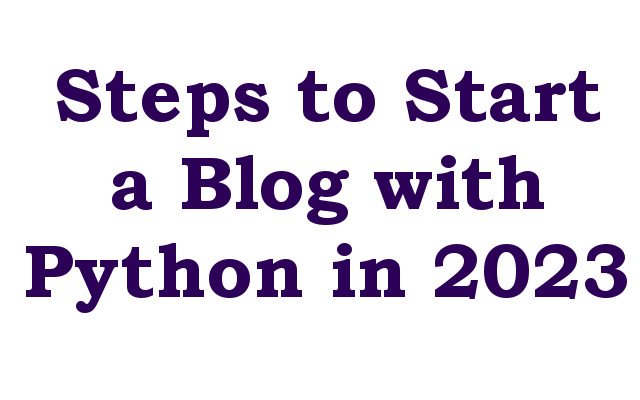Do you want steps to start a blog with Python in 2023, so starting blog is great way to share your thoughts and ideas with the world. In this article we are going to explore how to start blog using Python in 2023 and how to optimize it for search engines like Google.
Why Choose Python for Blogging?
Python is the most popular programming language that has large community of developers and users. it is beginner friendly language that has simple and easy to read syntax, and it is ideal for those who are new to programming. Python is also popular language for web development and there are many libraries and frameworks available that make it easy to build and maintain blog.
Steps to Start a Blog with Python in 2023
- Choose a Platform
First step in starting blog with Python is to choose a platform. there are many options and libraries available in Python such as custom built blogs, content management systems (CMS), and blogging platforms like WordPress, Django and Flask.
- Choose a Domain Name and Hosting Provider
Once you have chosen platform, the next step is to choose domain name and hosting provider. domain name is the web address that people will use to access your blog, and hosting provider is a company that provides the servers and storage space needed to host your blog.
- Install Python and Required Libraries
For starting a blog with Python, you will need to have Python installed on your computer. you can download and install Python from the official Python website. you will also need to install any libraries or frameworks that you plan to use for your blog.
- Create a Blog Template
Next, you will need to create template for your blog. template is the basic design and structure that your blog will use. you can use an existing template or create your own custom template.
- Write and Publish Your First Blog Post
Once you have set up your blog, you can start writing and publishing blog posts. for writing blog post you will need to use the platform or CMS that you have chosen. you can add text, images, and other media to your blog post and then publish it to your blog.
Optimizing Your Blog for Search Engines
To rank well in search engines like Google you will need to optimize your blog. these are some tips to help you optimize your blog for search engines:
- Use Relevant Keywords
Make sure that you use relevant keywords in your blog post titles and throughout the text of your posts. This will help search engines understand what your blog is about and help users find your blog when they search for related topics.
- Use Meta Descriptions
Meta descriptions are short descriptions that appear under your blog post title in search engine results. Make sure that you write descriptive and compelling meta descriptions that accurately reflect the content of your blog post.
- Use Heading Tags
Using heading tags, such as H1, H2, and H3, can help search engines understand the structure of your blog post and its main topics.
- Use Alt Text for Images
Alt text is a description of an image that is displayed when the image cannot be loaded. Make sure that you use descriptive and relevant alt text for all images on your blog.
- Get Backlinks
Backlinks are links from other websites that point to your blog. The more backlinks you have, the higher your blog will rank in search engines. You can get backlinks by reaching out to other bloggers in your niche and asking them to link to your blog.
Is it Good to use Python for Building Blog ?
Yes, Python is great choice for building blog applications. Python is powerful and popular programming language that has large community of developers and users. tt is beginner friendly and has simple syntax and it is easy to learn and use for those who are new to programming.
In addition, Python has different libraries and frameworks available for web development, and it is easy to build and maintain blog in Python. for example, Django and Flask are popular frameworks for building dynamic websites and web applications, including blogs.
Python is also known for its scalability and efficiency, which makes it a good choice for building blog that may grow in popularity and traffic over time.
Overall, Python is good choice for building a blog due to its versatility, ease of use, and the availability of resources and libraries for web development.
-
Learn More on Python
- Get Started with wxPython: A Complete Guide to Building GUI Applications
- Python: The Most Versatile Programming Language of the 21st Century
- Tkinter: A Beginner’s Guide to Building GUI Applications in Python
- PySide6: The Cross-Platform GUI Framework for Python
- The Ultimate Guide to Kivy: Building Cross-Platform Apps with Python
- Discover the Power of Django: The Best Web Framework for Your Next Project
- How to Earn Money with Python
- Why Flask is the Ideal Micro-Web Framework
- Python Pillow: The Ultimate Guide to Image Processing with Python
- Get Started with Pygame: A Beginner’s Guide to Game Development with Python
- Python PyOpenGL: A Guide to High-Performance 3D Graphics in Python
- The Cross-Platform Game Development Library in Python
- Unleash the Power of Computer Vision with Python OpenCV
- PyQt6 Charts: An Overview and its Importance in Data Visualization

